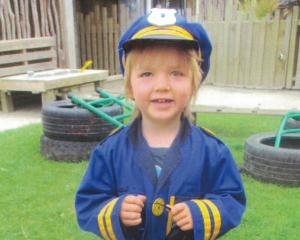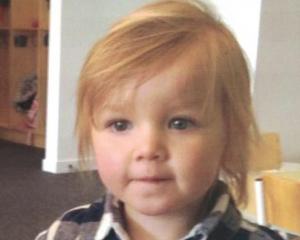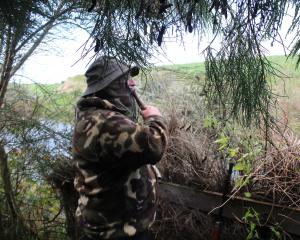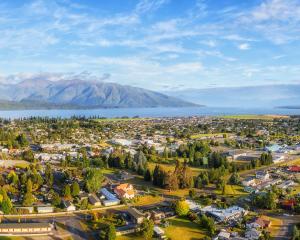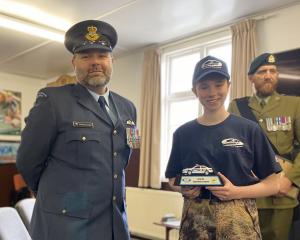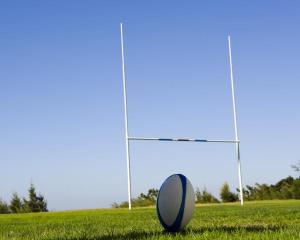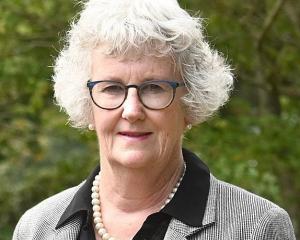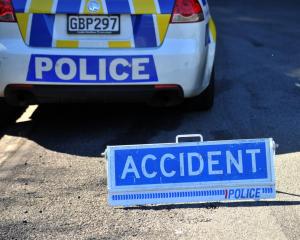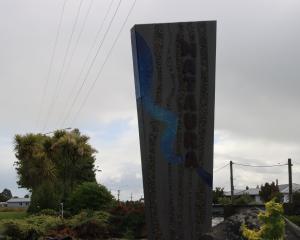Winchman Lester Stevens, pilot Andrew "Heff" Hefford and St John paramedic John Lambeth are speaking at a press conference today.
The trio were miraculously found alive following a helicopter crash in the Southern Ocean near Enderby Island on Monday
Lambeth said the training kicked straight in with the crash in the first 15 seconds of getting out of the helicopter.
"I can freely admit there was a few seconds of sheer panic."
The thought ran through his head: "I'm going to drown"
He quickly got himself out of that head-space "as soon as I took a breath" and got out of the helicopter.
He became orientated and could clearly make out the outline of a helicopter.
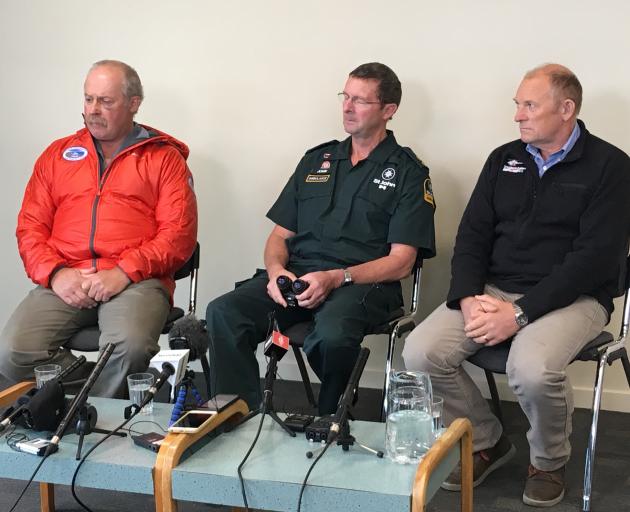
He closed his eyes to orientate himself and unbuckled his seatbelt. It was dark and the water flooded the cabin fast, he said.
He pulled his headset out and pushed himself up. There were seconds of panic and he thought he was going to drown.
As soon as he took a breath he felt confident he would survive.
Lambeth said his training enabled him to close out distractions and concentrate on getting out of the chopper.
"It was that training that pulled us through this without a doubt."
Lambeth said he didn't even have time to think about the chopper blades.
Once out of the chopper he started shouting to find the others.
Hefford had helped him to free Stevens.
There was a slight light from a chopper cabin light - and then it went completely dark.
"We were all together by that time," Lambeth said.
They could see the silhouette of a cliff face about 100m away.
Lambeth and Hefford only talked about "we've got to get out of here," Lambeth said.
On land they climbed over kelp and on to rocks. They paused to refocus. Lester had a bleeding nose. His shoulder was "displaced" and not functioning well.
By then Lester was coherent, said Lambeth, who was battling a fractured rib.
"Once we were alive we thought 'we're going to survive this'."
At shore there were huge cliff faces above them and they discussed which way to go.
Hefford's view was to go right towards Enderby Island. They spent up to 40 minutes climbing over kelp and rocks and clinging on at the bottom of a cliff face. He remembered he had a head torch, got it out and it worked.
Their cold water immersion survival suits were the difference between life and death.
The trio spent about an hour navigating around the foot of the rockface - battling through the kelp was "hell".
They got to a creek and followed it up a way and made camp. Lambeth said they knew a rain band was coming. They were wet and warm in their suits.
They found a concave log large enough to accommodate them - and cut sticks and put vegetation on the top and ferns underneath and hunkered down for the night.
Asked about their emotions, Lambeth said they knew they were going to get out of their predicament.
They noticed an Air Force Orion was flying overhead during the night.
"The night dragged on and on and on."
Hefford had a plan worked out moving to a more visible place on the beach.
"Lets just go down there and settle ourselves in," Lambeth said.
"We heard the Squirrel coming and it's a familiar sound to us the Squirrel helicopter."
Strong emotions flooded in as their rescuers arrived and there were some "big hugs" on the beach.
The first thing Lambeth wanted to do when he got to the mainland was to make sure his family was safe as they had done the "emotional hard work".
'I think I was the last one up'
Andrew "Heff" Hefford, the pilot, of Southern Lakes Helicopters, said his first reaction in the crash was to panic a bit initially, with mouthfuls of sea water. The helicopter's door was gone.
He initially forgot to undo his seatbelt, then coughed and spluttered and yelled out asking who was alive.
"I think I was the last one up," he said.
They had a bit of a mission to walk and crawl around the base of the cliff.
"We're all outdoors people so know how to make a bivvy and survive," Hefford said.
Hefford said that when the helicopter sank they had to start swimming. Lester had come to and started kicking.
The trio used night vision goggle boxes as flotation devices.
They didn't inflate their lifejackets in the water and are glad they didn't because they might have slowed them down, Hefford said.
The chopper sank nose first. Hefford was initially concerned for Lester but once they got to the cliff he was coherent and able to speak.
Hefford said he had a sore back when he got out of the helicopter but didn't worry about it too much.
Once the trio made it to the rocky coastline and into the bush it was a "sigh of relief".
They made a "nice mattress" of ferns.
Hearing the Orion plane overhead was a comfort, knowing a search was under way. They flashed a torch into the air a couple of times towards the search plane.
Hefford said that once they got to the cliff there was no point at which he thought they were going to die.
Lambeth took the lens off the night vision goggles to try to light a fire from the sun, which almost worked, Hefford said.
He saw a fishing trawler that was searching for them and flashed a torch in their direction but it moved past without responding.
Hefford said they didn't doubt that they would be rescued - and when they were it was hugs all round.
The trio were discovered the next morning by Southern Lakes Helicopters owner Sir Richard 'Hannibal' Hayes.
"I never thought I would get a hug from my boss."
Hefford said they didn't doubt that they would be rescued and when they were it was hugs all round. "I never thought I would get a hug from my boss."
Hefford spoke to his wife on a satellite phone and said. "Gidday, I'm here we're okay. Pretty emotional".
His wife's response was pretty emotional as well - she was "pretty happy to hear from me".
'I just came to on the top of the water'
Winch operator Lester Stevens said he could not remember anything about the crash until he woke up on his back in the water.
"I had no idea where I was or why I was swimming at that stage."
When he came to his senses he started kicking in the water with the "two guys beside" him till they got to shore.
It took a minute or two to remember why he might be in the water in the middle of the night. It was like waking from a very weird dream, Stevens said.
His mates didn't have to explain. He worked out why he was there. "There was no panic on my part ... I just came to on the top of the water."
John Lambeth told Stevens to "stay together" and swim. "I just lay on my back and kicked." He's not sure how long they were in the water but it "seemed a wee while".
As they got to the base of the cliff he experienced significant pain in one shoulder. He climbed onto a shelf. There was no way of climbing up the cliff or staying there safely so they moved along the base of the cliff through kelp, water and rocks.
He never thought the trio wouldn't survive.
In their bivvy Stevens didn't manage to sleep - but he noticed snoring from his mates.
Stevens said he believed he had suffered a torn ligament in his shoulder and has a broken nose and pronounced bruising on his torso.
Hunger was never a problem, he said. There was a brackish creek nearby, with seals nearby, that they didn't dare drink from.
When the rescue chopper landed, "I rang my wife and it was great she was extremely pleased to talk to me because I know she feared the worst," he said.
"Big tough men. I was a bit choked up," Stevens said.
Having listened to Hefford and Lambeth's accounts "it sounds like I was history without their help" when the helicopter crashed.
Miraculous escape
Winch operator Lester Stevens came to in the icy cold Southern Ocean wondering "what the hell" was going on. Meanwhile after the miraculous escape from their downed helicopter, pilot Andrew Hefford's thoughts turned to sharks.
The pair, who along with paramedic Lambeth, were miraculously found alive following a helicopter crash in the Southern Ocean near Enderby Island on Monday , spoke to Newshub yesterday revealing fresh details about their ordeal.
Mr Hefford said he thought he had escaped unscathed from the crash, but was actually left with a fractured a vertebrae in his back and a "badly bruised bum".
He recalled his immediate reaction to the helicopter coming down.
"I remember sitting there gulping mouthfuls of water, bloody thinking shit 'I've got to get out of here'."
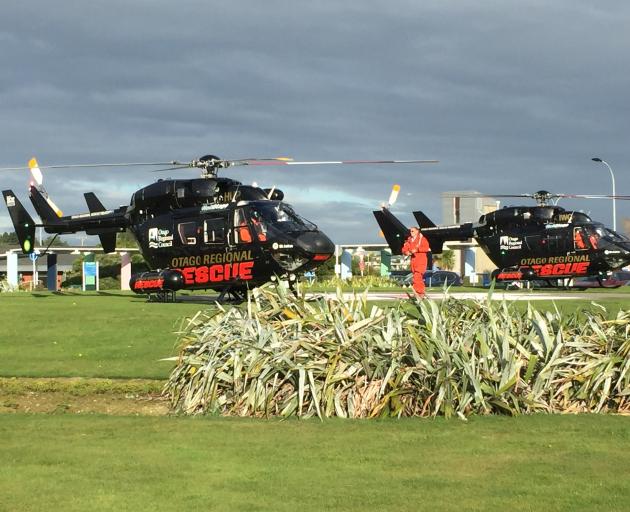
After that his training kicked in and he managed to escape the helicopter, which fortunately had lost its door.
His next thought turned to the risk of being attacked by sharks.
Mr Stevens said he also thought about sharks and recalled a rescue mission to retrieve someone who had been bitten in the Southern Ocean.
He was left considerably more injured and only came to after he was luckily forced out of the helicopter on impact.
"I sort of came to on my back in the water and someone was saying something about swimming."
His reaction was: "What the hell are we swimming for, what's this all about."
He could not swim properly because of his dislocated shoulder and ended up going on his back and kicking.
The trio made it to shore for a long night.
"It seemed like a week rather than a night."
They heard helicopters all morning before they were finally rescued.
ODT with NZME
Comments
These good news stories make my day, totally awesome and respect to all such emergency services provided by such people as these heroes . Having been to the Auckland and Campbell islands a few times via ship the conditions are very testing. Respect



